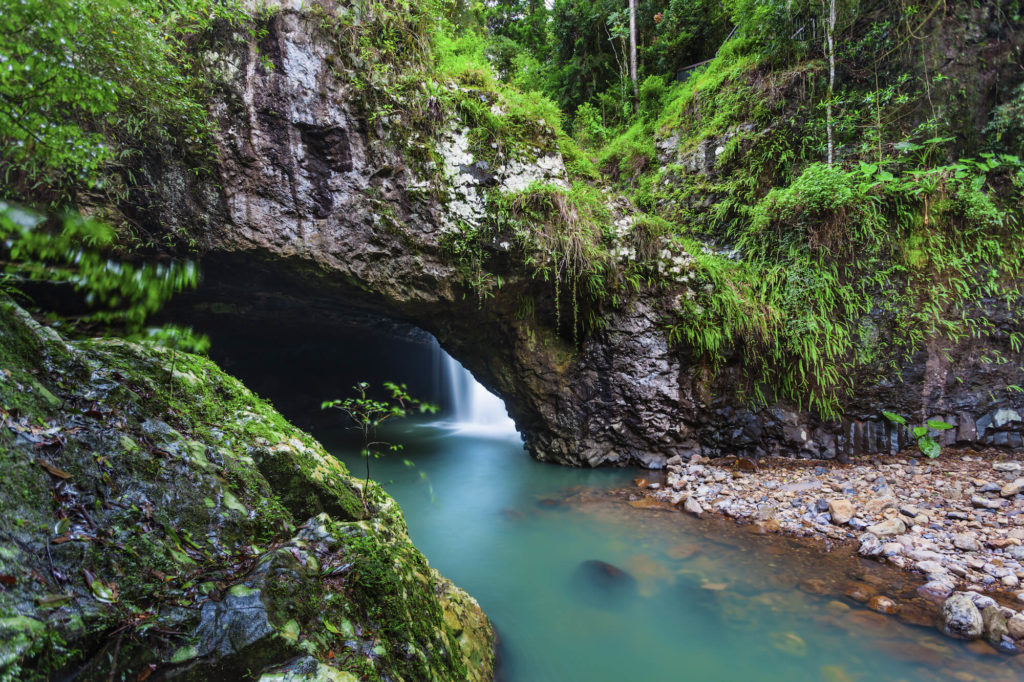Springbrook is home to a globally important Gondwanan rainforest ecosystem in the Gold Coast hinterland. Water is the lifeblood of Springbrook’s native plants and animals, like the endangered ravine orchid, cascade treefrog and the near threatened Albert’s lyrebird.
Earlier this year, EDO lawyers were in court on behalf of the Australian Rainforest Conservation Society (ARCS), who took legal action over plans to drain 16 million litres of water a year from Springbrook, potentially to be bottled and sold as “spring water”.
Thanks to our client’s legal action, Hoffmann Drilling still doesn’t have approval to take water from Springbrook. EDO lawyers will be back in court later in the year to continue our work defending this precious rainforest from impacts posed by the mining application.
Bottled water industry a major threat to local communities and ecosystems
The proposal to extract water from Springbrook is just one project of many threatening the health of our rainforests. Water miners have already drilled deep into this ancient ecosystem and removed truckloads of water from aquifers at Springbrook and nearby Tamborine Mountain.
Coca-Cola Amatil is one of several companies taking millions of litres of local groundwater from the region for free, for selling in plastic bottles.
EDO lawyers are working with First Nations and other local residents throughout Springbrook and Tamborine Mountain to seek a permanent moratorium on water extraction near these vulnerable rainforest ecosystems, and to strengthen regulation of existing operators.
EDO is seeking to put an end to the expansion of the water mining industry in the region.

Mining for bottled water continues as local bores run dry
Groundwater mining is not regulated by the state government in Springbrook or Tamborine Mountain. Water mines frequently operate without caps or monitoring on water take, and don’t have to pay anything for the water they truck away from these ecosystems. Very little is known about the industry’s long-term impact on rainforest ecosystems and community drinking water.
The situation reached crisis point in 2019 when local bores and rainwater tanks in Tamborine Mountain ran dry and the state school ran out of water.
Yet even as residents were forced to wait more than six weeks for emergency water deliveries to fill their dry tanks, water miners continued to truck millions of litres of local water off the mountain to send to water bottling plants.
😮 Qld school runs out of water as commercial bottlers harvest local supplies
— Geoff Payne (@geoffrey_payne) December 12, 2019
Parents told to consider keeping Tamborine Mountain state school students at home, while trucks take local water to bottling plants for companies including Coca-Cola#Qldpolhttps://t.co/CxEhKWzbHW
In early 2020, the Queensland Government stepped in and placed a 12-month moratorium on water mining in the area. It’s been extended three times and is in place until 2024 while the region’s water plan is under review. Hoffman Drilling applied for its approval before the moratorium was in place.
EDO is working to make this moratorium permanent
Along with seeking a permanent moratorium on new or expanded water extraction, we are advocating to the Queensland Government for a state water licencing regime to be put in place.
This will strengthen regulation of existing operators so that they have a cap on water take, there is a price on the water they are profiting from, and triggers are put in place to stop pumping through periods of little rainfall.
Healthy rivers, aquifers and wetlands are essential for all life on Earth. World Heritage rainforests should be out of reach for water miners and plastic bottle producers.
Local communities and Traditional Owners in Springbrook and Mount Tamborine are standing up to protect their water from commercial interests, working with side by side with EDO lawyers toward stronger water laws and an end to damaging, water-guzzling projects that put communities and nature at risk.





